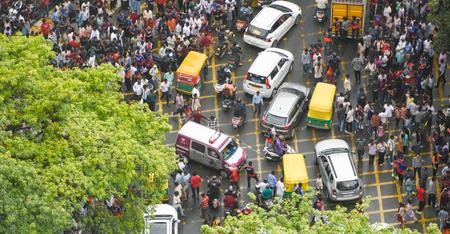
Govt in report on Chinnaswamy Stadium stampede submitted to HC blames RCB for excessive turnout
text_fieldsBengaluru: The Karnataka government on Thursday submitted a status report to the High Court about the Chinnaswamy Stadium stampede in Bengaluru, which claimed 11 lives and injured over 50 people. In its report to the HC, it highlighted significant breaches and mismanagement by the franchise Royal Challengers Bengaluru.
According to the state government, no formal authorisation was obtained from the event organiser (DNA), who just informed police about the Royal Challengers Bengaluru (RCB) victory parade on June 3 without requesting formal consent as required by the 2009 municipal order.
As a result, the police denied permission. Despite police denials, RCB promoted the event. On June 4, they sent open invitations on social media, including a video appeal from Virat Kohli for fans to join the free-entry celebration.
According to the report, at about 6.30 pm, just hours before the IPL final between RCB and Punjab Kings (PBKS) in Ahmedabad, the KSCA on behalf of DNA Networks Pvt Ltd submitted a letter of intimation to the Cubbon Park police station, TNIE reported.
According to the report, on June 4, 2025, Royal Challengers Bangalore (RCB) announced via their official social media accounts—including Instagram, Facebook, and X—that entry to their Victory Parade was open to the public, without prior approval or consultation from the Bangalore City Police.
The first post, published at 7:01 a.m., stated that the parade would begin at Vidhana Soudha and end at Chinnaswamy Stadium.
Later, around 8:00 a.m., RCB reportedly reiterated the same information in a second post. Shortly after, at approximately 8:55 a.m., the team also shared a video on X featuring cricketer Virat Kohli. In the clip, Kohli conveyed that the team was looking forward to celebrating their win with RCB fans and the people of Bengaluru on the same day.
A final post at 3.14 p.m. announced that the parade would begin at 5 p.m., and would be followed by celebrations in the stadium. This post was the first to mention that free passes were available online, but it came after large crowds had already started gathering.
The posts garnered widespread attention, with the first four updates accumulating viewership figures of 16 lakh, 4.26 lakh, 7.6 lakh, and 17 lakh, respectively.
Authorities reported that an unexpectedly large crowd overwhelmed the arrangements at the RCB Victory Parade event, far surpassing what organisers and law enforcement had anticipated.
As the venue became overcrowded, organisers abruptly changed the earlier open-entry policy by announcing at around 3:14 p.m. that access to the stadium would now require passes. This sudden shift contradicted previous announcements and led to widespread confusion and panic among the public.
The state government later pointed out a lack of coordination among Royal Challengers Bangalore (RCB), DNA Entertainment Networks, and the Karnataka State Cricket Association (KSCA), blaming the mismanagement at stadium gates and delayed entry procedures for the chaos.
As a result, a stampede broke out, injuring at least seven police personnel. In response, the police scaled down the event and allowed it to continue in a restricted, controlled manner to avoid further incidents.
The incident, which occurred on June 4, resulted in the deaths of 11 individuals and injuries to more than 30 others, as nearly 3 lakh people had gathered near Bengaluru’s M Chinnaswamy Stadium to witness the Indian Premier League victory celebration of the RCB team.
Following the tragedy, the Karnataka government initiated both magisterial and judicial investigations. FIRs were filed, disciplinary measures were taken against several police officers, and the Chief Minister’s political secretary was suspended. Additionally, the state intelligence chief was transferred.
The government also announced monetary compensation for the victims. Initially, Chief Minister Siddaramaiah declared an ex gratia payment of ₹10 lakh for the families of the deceased, but later increased it to ₹25 lakh per family. A retired High Court judge was appointed to lead a one-person commission to investigate the matter.












